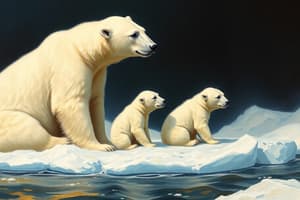Podcast
Questions and Answers
What is the first stage of the elephant life cycle?
What is the first stage of the elephant life cycle?
- Juvenile
- Pregnant
- Calf (correct)
- Adult
Which of the following stages is NOT part of the human life cycle?
Which of the following stages is NOT part of the human life cycle?
- Late adulthood
- Toddler
- Young adult
- Calf (correct)
What does it mean when a species is considered extinct?
What does it mean when a species is considered extinct?
- Its last specimen completes its life cycle without leaving offspring (correct)
- It can no longer adapt to its habitat
- It has migrated to a different environment
- It has evolved into a new species
During which stage does a frog NOT have legs?
During which stage does a frog NOT have legs?
Which of the following milestones is typically included in human development?
Which of the following milestones is typically included in human development?
Flashcards are hidden until you start studying
Study Notes
Life Cycles Overview
- Life cycles represent the series of developmental stages all living organisms undergo from birth to reproduction.
- Extinction occurs when the last individual of a species lives out its life cycle without producing offspring.
Mammal Life Cycle
- Mammals experience gestation, where they develop inside their mother.
- example of a mammal life cycle includes:
- Calf: The young elephant stage.
- Juvenile: The adolescent stage leading to adulthood.
- Adult: The mature stage capable of reproduction.
Frog Life Cycle
- Frogs undergo a distinct transformation with several stages:
- Eggs: Laid in water, embryos develop.
- Tailbud: Early development stage preceding the tadpole.
- Tadpole: Aquatic larvae with a tail and no legs.
- Tadpole with hind legs: Developmental phase indicating growth.
- Tadpole with forelegs: Further maturity stage before becoming an adult.
- Adult frog: Fully developed and capable of reproduction.
Human Life Cycle
- Human development is categorized into key stages, including:
- Infancy: Initial stage of human life.
- Toddler: Early walking and talking years.
- Childhood: Growth phase with social and cognitive development.
- Adolescent: Transition to young adulthood with further identity formation.
- Young adult: Beginning of independence and establishing careers.
- Middle adulthood: Responsibilities often peak, with focus on family and career.
- Late adulthood: Final life stage, involves reflection and adaptation to aging.
Key Milestones in Human Development
- Key developmental milestones include:
- Crawl: Early movement stage for infants.
- Talk: Development of verbal communication skills.
- Walk: Major physical milestone indicating mobility.
- Run: Enhanced coordination and strength.
- Grow: Physical changes and maturation.
- Eat: Development of dietary habits and nutritional needs.
- Grab: Fine motor skills development crucial for dexterity.
Studying That Suits You
Use AI to generate personalized quizzes and flashcards to suit your learning preferences.




